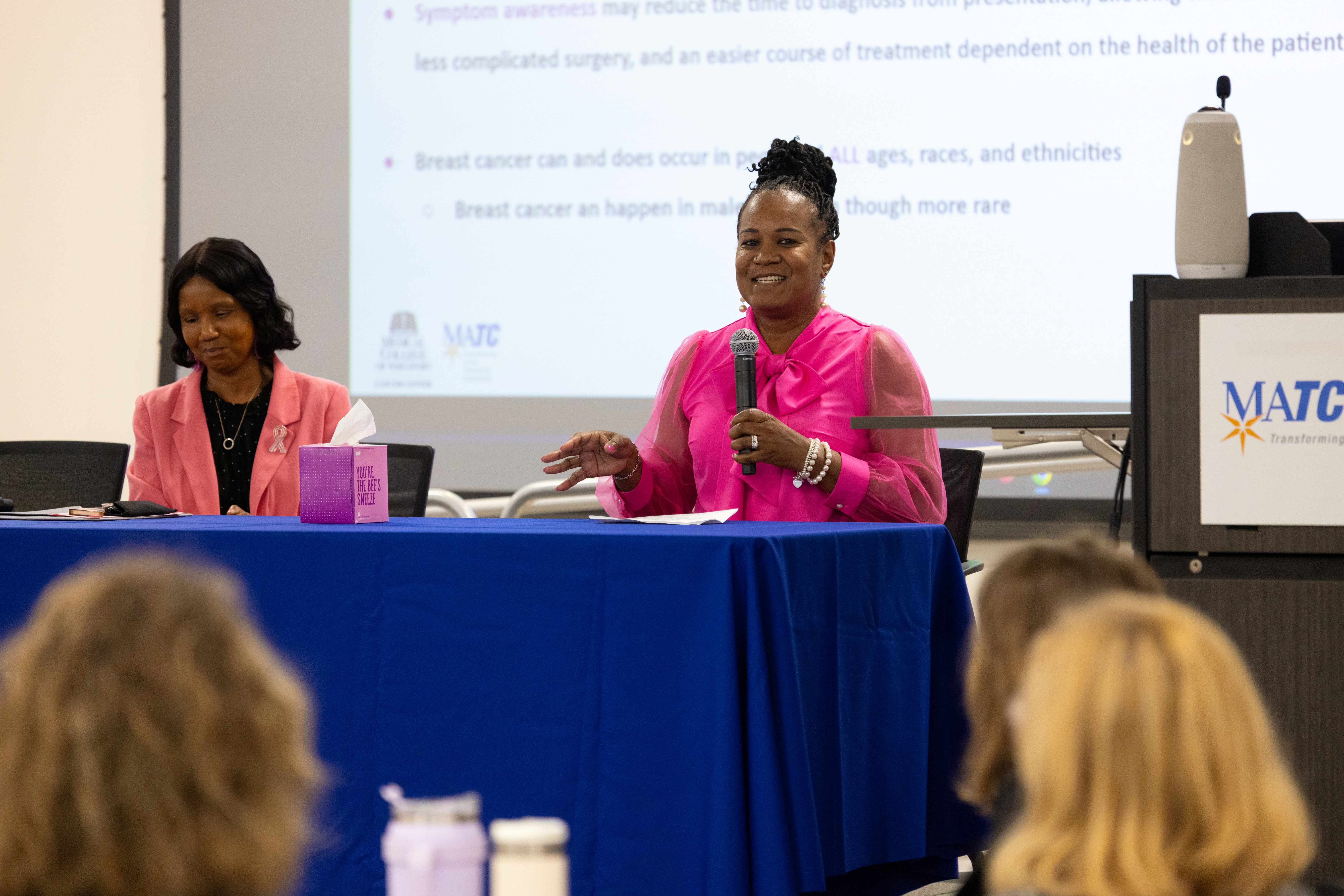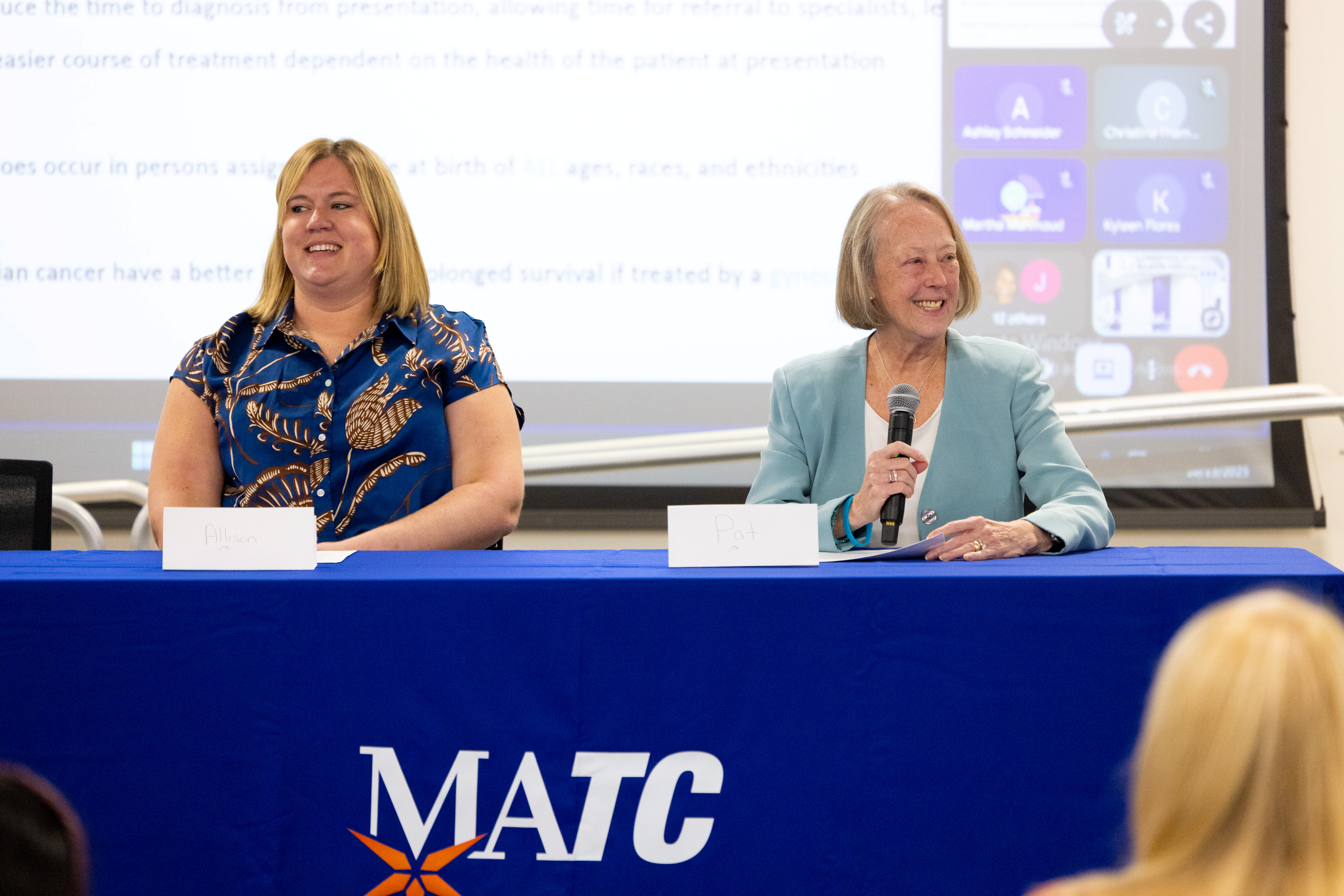
When it comes to our health, we shouldn’t be silent. We should talk about it.
Dr. Valencia Brown battled breast cancer virtually alone.
When Brown, dean of the Community and Human Services Academic and Career Pathway at Milwaukee Area Technical College, was diagnosed with the disease 10 years ago, she hardly told a soul.
“I didn’t want anyone to know,” she recalled. “I didn’t want people feeling sorry for me. But that was the wrong decision. Don’t do that to people. If I had to do it all over again, I’d tell the people around me.”
Openly talking about testing and treating gynecological and breast cancer is one of the best ways to help beat the dreaded diseases, said medical experts and cancer survivors on Monday, October 13, at MATC’s Downtown Milwaukee Campus.
About 150 MATC students, faculty and staff, along with community members, attended “Breaking the Silence,” a panel discussion presented by MATC’s Healthcare Pathway and office of Public Health during national Breast Cancer Awareness Month.
“When it comes to our health, we shouldn’t be silent. We should talk about it,” MATC President Anthony Cruz said at the event. “It’s through conversation that we learn from others and through conversation we can inform others about our health. I encourage each of you to have conversations with your loved ones about their health and use resources.”
Dr. Cruz said his mother noticed a lump 13 years ago and discovered she had cancer. But because she caught it early and received treatment, today she’s a cancer survivor, he said.
Dr. James Wu and Lauren Laskowski from the Medical College of Wisconsin and the Community and Cancer Science Network explained the types of gynecological and breast cancers, the incidence rates, the symptoms, and treatments.
Among the information they shared:
- Uterine cancer is the most common type of gynecological cancer; ovarian cancer is the deadliest.
- Incidence rates of gynecological cancer are higher among Black females.
- Breast cancer is the most common cancer diagnosed among women in the United States.
- Breast cancer is the second leading cause of death from cancer among women. Lung cancer is the first.
- When breast cancer is detected early, and is in a localized stage, the five-year relative survival rate is 99%.
Dr. Brown was one of the four women who related their stories of battling and surviving cancer.
She said she never really thought about cancer 10 years ago. Then she had a chance to earn a $25 gift card if she got a mammogram. That procedure turned into a call from a doctor, another exam, a biopsy, an MRI and then a diagnosis: Stage 1 cancer.
“I needed to stay positive,” she said. “But whatever stage cancer you have, you’re still scared.”
She had two surgeries and underwent six weeks of radiation treatment. She took various medications for five years and had checkups every month. In September 2024, she had gone two years cancer free.
“Go get checked out,” Dr. Brown urged the audience. “Don’t let it take a gift card to save your life.”
In 2021, Illinois resident Patricia Rusthoven was experiencing pain, diarrhea and bloating. “I looked like I was 10 months pregnant,” she said. Her primary physician at first diagnosed ulcers. But subsequent tests discovered Stage 4 ovarian cancer. She was 71.
“I asked my doctors, ‘How do I survive this?’ and they said to remain positive,” she said. “That’s what I did.”
She underwent chemotherapy, surgery and more chemotherapy. She lost all of her hair and her sense of taste. She battled diarrhea and constipation. She lost more than 30 pounds.
“I’m still here,” she said as the crowd applauded. “Cancer changed everything in my life. I became a warrior. I am thankful and blessed to be here.”
Keeisha Jones agreed. She was diagnosed with Stage 1 breast cancer at 46 years old and underwent radiation, medication, injections and infusions. “I’m still in the fight,” she said. “I look for joy every day.”
Many of the students at the event will be future healthcare professionals who will test for and treat serious diseases such as cancer.
“You will be entrusted with helping and educating us about our health,” Dr. Cruz said. “As you are talking to us about our health, some of us won’t always listen. But, please keep telling us.”
About MATC: Wisconsin’s largest technical college and one of the most diverse two-year institutions in the Midwest, Milwaukee Area Technical College is a key driver of southeastern Wisconsin’s economy and has provided innovative education in the region since 1912. More than 30,000 students per year attend the college’s four campuses and community-based sites or learn online. MATC offers affordable and accessible education and training opportunities that empower and transform lives in the community. The college offers more than 180 academic programs — many that prepare students for jobs immediately upon completion and others that provide transfer options leading to bachelor’s degrees with more than 40 four-year colleges and universities. Overwhelmingly, MATC graduates build careers and businesses in southeastern Wisconsin. The college is accredited by the Higher Learning Commission.


